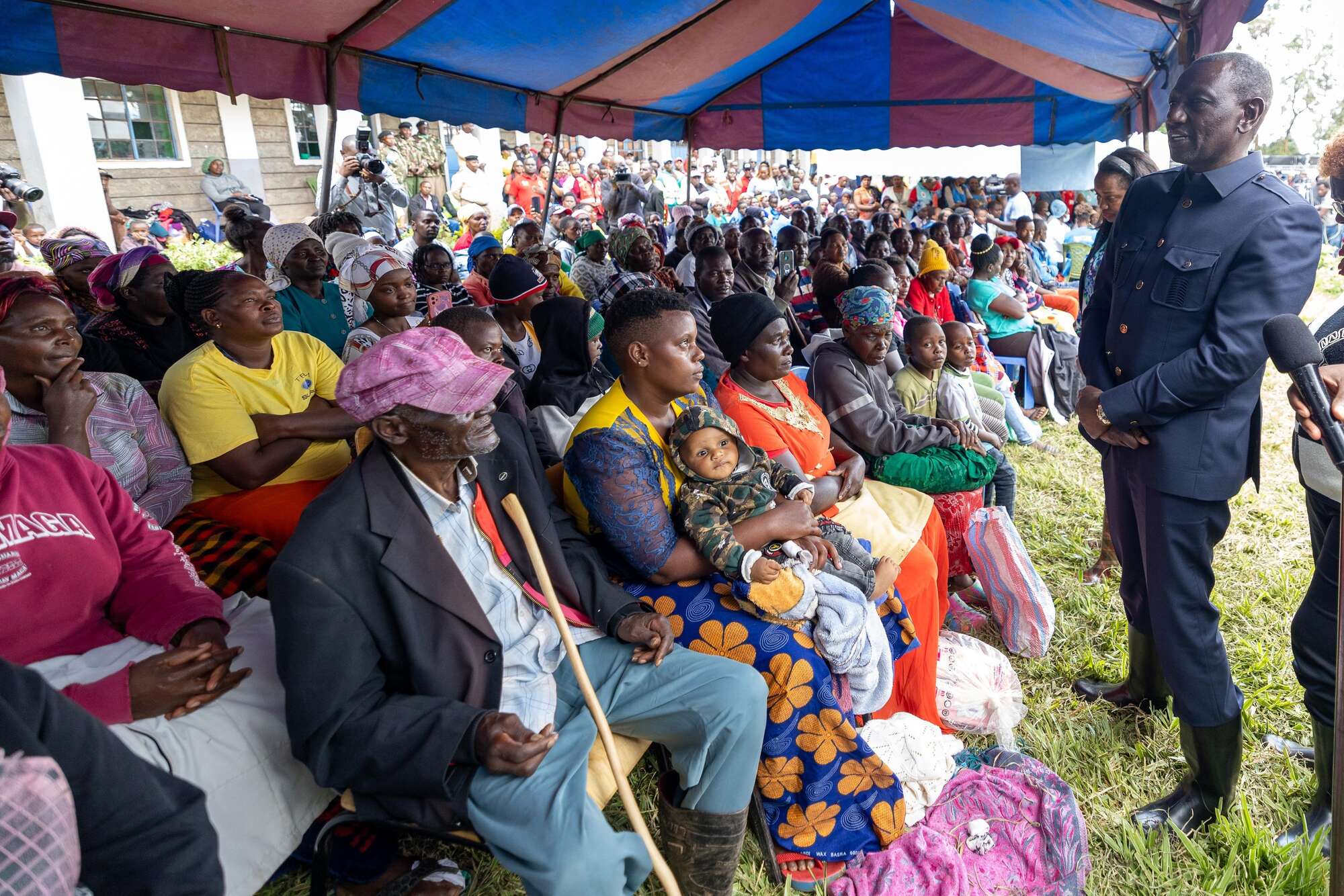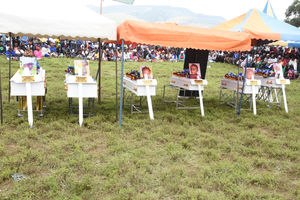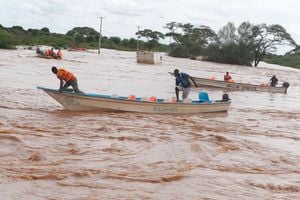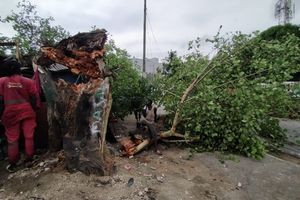
Mai Mahiu; where more than 60 people died after a water-filled gully collapsed during the night of April 29, 2024.
Eight months have passed since the nation was rocked by news of the devastating floods in Mai Mahiu, which swept through villages and claimed 61 lives.
For three months, the government helped families dig through the rubble in search of loved ones, provided basic services and much-needed counselling and psychological support, and promised a lasting solution to their suffering.
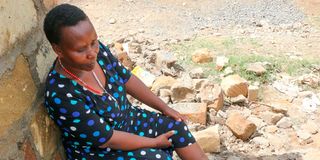
Mary Njeri Mugo, one of the survivors of the Mai Mahiu tragedy of April 29, 2024, shows her injured leg. She lost all her belongings.
But a visit to the villages this month reveals the pain of broken promises, of survivors abandoned and betrayed, of a village still grieving, and how the image of life before the flood is always a distant shadow, too far away to reach.
Here, residents who had clung to the hope of compensation and resettlement are, despite the circumstances, showing signs of life.
Some businesses have reopened and new homes are being built on the same land that was once destroyed.
Vegetation had begun to sprout in the villages of Jerusalem and Kamuchiri, and residents had levelled the land to plant crops where there had once been mud and rubble.
Although the air was fresh, memories of the past continued to haunt the villagers.
Ann Mwangi lost her two children in the tragedy.
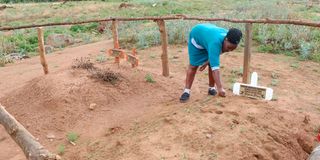
Rose Wanjiru Gakunga weeds three graves of members of her family who died in the Mai Mahiu tragedy on April 29, 2024.
She had searched the waters of the Ngeya River, where the flood waters originated, for any trace of her lost children, a small piece of their belongings or something to hold on to.
Her voice trembled as she recounted the tragic events of that night.
On that fateful day, her family had gathered for a meeting to discuss raising money to bail out her brother, who had been arrested.
After much discussion, the family decided to spend the night together at her mother's house.
But as they slept, disaster struck.
Eight people were killed, including Ann's daughter Blessing Muthoni, 8, and her son Lewis Ngige, just 1 year and 9 months old.
Their bodies were recovered days later.
"We lost six children and two adults in the tragedy, which was too much for the family to bear. After burying my children, it was the beginning of a hard time. Not a day goes by without me thinking of them. They were the source of my happiness. What hurts me more is that I have nothing tangible to remember them by. I am left with only the memories we shared," Ms Mwangi tearfully told Nation.Africa.
Before the flood, Ann had worked as a car wash attendant to support her family, but that job ended the night her home was swept away.
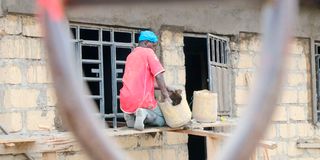
A manson works on a house in Jerusalem; Mai Mahiu in Nakuru County on December 5, 2024. Some of the families affected by the April 29, 2024 floods have already started rebuilding their houses.
Since then, her life has changed completely.
While the Nakuru County government waived her rent for three months, she had no other source of income.
The temporary relief soon ran out, leaving her to struggle on a daily basis.
"Even though we say we are moving on with our lives, it will never be the same. The incident left me traumatised and I cannot stand the sound of rain or thunder. Even though I was renting before the incident, I lost everything I had worked hard to acquire. Now the rent is taking a toll on me and I have no one to help me," said Ms Mwangi.
Ms Mwangi's mother, Mary Muthoni, has also suffered greatly.
In addition to losing her family members, she was injured and hospitalised at Naivasha Sub County Hospital for three weeks. When she was discharged, she had to face the painful reality of her losses.
Mary, who used to sell vegetables in Mai Mahiu, is now staying with relatives in Kinangop.
The death of her six grandchildren and two children haunts her every day.
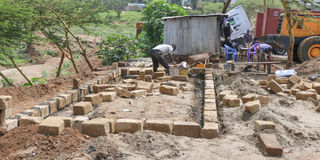
A few metres from her home, Mary Njeri Mugo is supervising four masons as they build a three-bedroom house on the land where her old house once stood.
She could barely walk after sustaining an injury to her left leg that left her hospitalised for five months.
Mary revealed that after months of waiting for the government to fulfil its promises, she had been forced to give up her tenancy and start over.
Fortunately, a donor had agreed to help her rebuild her home on the same plot of land as her old house.
"My life collapsed. I lost everything I had worked for in the three years I had lived in Kamuchiri. My five-room house, my livestock, all washed away. I was lucky enough to find a donor to help me rebuild, but it doesn't feel like home anymore. The government promised to buy us land and resettle us somewhere safe, but look at us now. Nobody has kept their word," she says sadly.
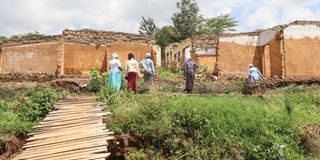
Mary Muthoni Mwangi and some of her family members in the rubble of their former home on December 5, 2024. They lost eight members of their family in the Mai Mahiu tragedy.
In Ruiru village, the destruction is still visible.
Huge boulders carried by the floodwaters have been deposited on people's farms, making it almost impossible to rebuild homes.
One of the victims, Rose Wanjiru, stared at her once fertile five acres of land, now covered in large boulders.
The land had become a 'tourist attraction' for those who visited the area to see the aftermath.
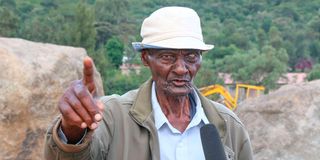
Mzee Waiganjo Kagotho, 87, who lost a son, cattle and a house in the Mai Mahiu tragedy on April 29, 2024.
Wanjiru lost her sister-in-law and two children in the floods.
"My mother and brother were admitted to Nakuru Teaching and Referral Hospital. The rest of us recovered, but my mother was left with permanent injuries. She now depends on me as she cannot walk.
We had a good life before the incident, but now we depend on donations from well-wishers to survive," says Wanjru.
Her frustration echoes that of many others who have been left to rebuild from the rubble after the government's promises of land and compensation fell through.
Another survivor, John Macharia, recounted the terrifying moment when the water first hit.
"My wife woke up and asked where the noise was coming from," he recalled.
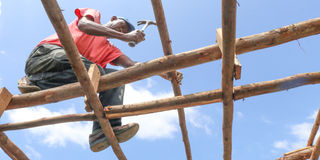
A resident of Jerusalem in Mai Mahiu rebuilds his house that was destroyed by floods during the Mai Mahiu tragedy on April 29, 2024.
The family got up to investigate, but before they could understand the source of the sound, the floodwaters separated them.
Macharia was swept away by the water but managed to cling to a tree until daylight.
"I was stunned and freezing. I waited until around 8 am when I was able to call for help. The rescuers wrapped me in a blanket and took me to hospital. I had head injuries and broken limbs, but the physical pain was nothing compared to the grief that awaited me at home," he told Nation.Africa.
In the chaos of that night, John lost his wife Beth Wairimu and two of their children, Lucia Mugure Macharia, 7, and Paul Karanja Macharia, 11. Only one child, Ruth Wairimu Macharia, survived.
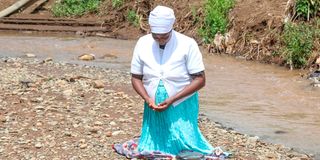
"Everything crumbled. My land was full of stones, but I thank God for the second chance to live. I wasn't washed away and I hope to get a job and rebuild my life piece by piece, but I won't remarry. I'm in my sunset years and there's no point in starting over. I am just praying for enough food to sustain me for the rest of my life," he told Nation.Africa.
Ireri Nyaga called on the government to fulfil its promises to the victims.
"We have nothing left. We are relying on donations to rebuild and still no one has kept their word. We are on our own," he said.
Despite the devastation, the people of Mai Mahiu have not given up.
They are slowly rebuilding, brick by brick, house by house.


